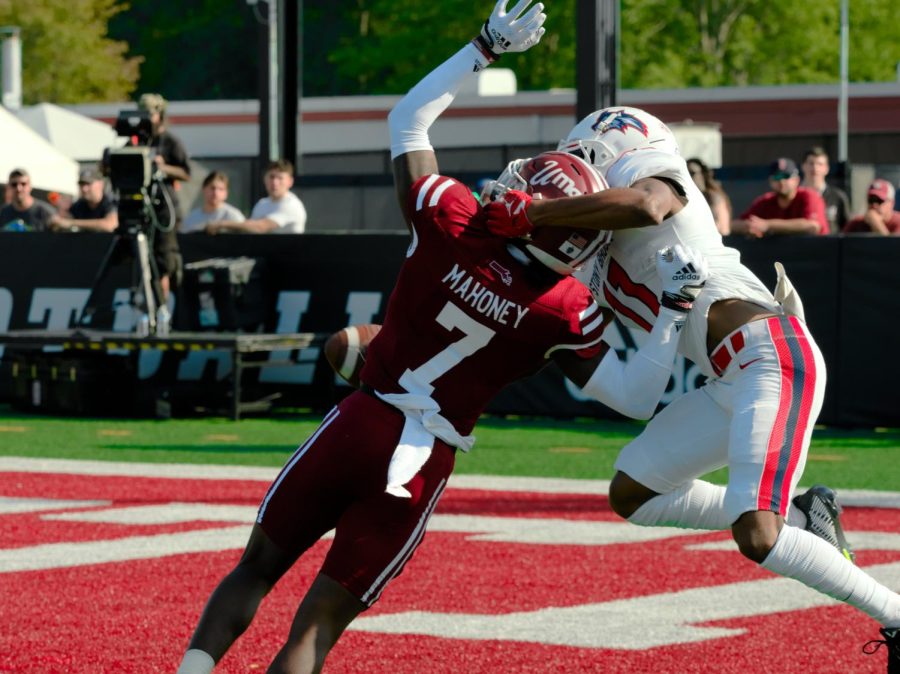Four months ago, the University of Massachusetts released its updated commitment to combating racism on campus as the Black Lives Matter movement gained greater momentum nationwide.
The seven initiatives, outlined in an email to the campus community, addressed measures that would be taken by administration to combat racism on campus. Nefertiti Walker, interim vice chancellor of Diversity, Equity and Inclusion, sent the initial email in June.
As previously reported by the Daily Collegian, the email “outlined the University’s plan to establish groups such as the Diversity, Equity and Inclusion Leadership Council, the Task Force for Anti-Racism, [and] Critical Incident Team.” Since then, Walker has worked with administration, faculty and student groups to progress the initiatives.
“Our commitment is to absolutely do everything through the prism of social justice,” she said.
Walker explained that the work of the Office for Equity and Inclusion focuses on creating change at both the individual and systemic levels.
“In the Office of Equity and Inclusion, we have to approach both the individual and the systemic [change]. But it just so happens to be that systemic is certainly much more feasible for us to do for a 36,000-person campus than the individual,” she said.
Fall Semester in Retrospect: Implemented Initiatives
Of the measures outlined in June, several have been launched, University spokesperson Ed Blaguszewski said in a statement to the Daily Collegian. These include the formation of groups such as the Diversity, Equity, and Inclusion Leadership Council, the student advisory board for the Office of Equity and Inclusion, and the Critical Incident Rapid Response Team.
The Leadership Council, which reports to the chancellor of the University, “will spend time reviewing and ensuring that social and racial justice are present in the strategic plan that guides the campus toward inclusive excellence,” as well as address campus climate issues, said Blaguszewski.
The Critical Incident Rapid Response Team is made up of University administratiors across various departments, such as “the chancellor’s office, Student Affairs, Office of Equity and Inclusion, Human Resources, the Provosts’ Office and University Relations,” Blaguszewki said.
The student advisory board has met three times over the course of the fall semester, in which it has provided feedback regarding “communication efforts and antiracism task force membership” on Diversity, Equity and Inclusion and “been a part of administrative meetings with the Racial Justice Coalition,” he said.
The board includes members of the Student Government Association and the Racial Justice Coalition, two groups that have worked extensively on social and racial justice initiatives in recent months.
Members of the board have been working with Walker to remain “in the loop around what [the Diversity, Equity, and Inclusion office is] doing, [and] see how they can be better supporting students [and] better communicating with students,” SGA President Sonya Epstein said.
Other initiatives taken on by the University administration include pilot programs for respectful workplace training, which wrapped up earlier this month, and the three-day “Divided Communities Project: Campus Academy.”
For Campus Academy, members of the administration went “through real-time simulations of highly disruptive campus climate issues, attended presentations from administrators and public safety officials who managed prominent (and nationally-covered) incidents on university campuses and collaborated in workshops to share what has worked, challenges, and strategies for new approaches,” Blaguszeski said.
Whether the progress that the University has made is sufficient, however, remains a point of contention from, as described by members within the UMass community.
The Student Perspective
The Racial Justice Coalition was formed shortly after the death of George Floyd, which catalyzed protests around the nation and moved Zach Steward, a junior African-American studies and legal studies major, to create a list of “ideas and actions for UMass to take in order to stand in solidarity with protesters across the country and around the world,” he said.
Steward was also joined by students Emily Steen and James Cordero to develop ideas and present the University with “Action Steps” in order to become an anti-racist campus.
Although the RJC worked closely with the University administration, Steward said the administration has been lacking in fulfilling its commitment to fighting racism on campus.
Despite difficulties caused by the COVID-19 pandemic, such as financial deficiencies, changing how and when these plans can be implemented, Steward said it is not a complete deterrent from implementing them in the short-term.
“It shouldn’t take four months to implement a new email system for hate crimes or a new system for floor meetings for hate crimes,” said Steward. “It shouldn’t take four months to empower student voices.”
According to Steward, the anti-racism efforts of students on campus and administration should ultimately create a campus in which students who are not cisgender, heterosexual white males “feel comfortable.”
“They should feel as though they belong. They should feel happy. They should feel like the school is theirs,” he said.
From Steward’s own experience and that of his peers, this has not yet become a reality. During his freshman year, he and other students of color experienced a “rash of hate crimes” that included racist statements on the bathroom mirrors in the Melville residence hall.
Although a few years have passed since the incident, the responsibility of a public institution, such as UMass, remains a point of debate when it comes to individual acts of racism on campus.
“I would say that UMass is responsible when they don’t address the acts of racism on campus,” said Steward. “When they do address them, they try to whitewash it, or they try to sweep it under the rug. And they try to make it seem as though it’s not as bad as it really was.”
According to Steward, one way that the University can create a more welcoming environment for BIPOC students in the near future includes strengthening support systems on campus.
“The support systems on campus, at least in my experience have been pretty good. It’s just [that] they aren’t as advertised,” said Steward.
UMass for Black Lives is another movement created by students who have played a significant role in the collaboration between administration, faculty and students to implement these plans throughout the semester.
Wayne Barnaby, a doctoral student studying neuroscience and behavior, and Lian Guo, a doctoral student studying organismic and evolutionary biology, co-authored the movement to stand in solidarity with the nationwide demands for racial justice after seeing a lack of acknowledgment for the issues and support for Black and brown students from their graduate programs and administration.
“There’s an assumption that when you come to an institution like UMass, they’re going to provide a safe academic learning environment,” said Barnaby, addressing UMass’s role as a public institution.
Guo said she is grateful for the progress that has been made considering the slow process in which things change institutionally, although many areas that lack improvement still remain.
“I would say the progress has been patchwork,” said Guo. “[For] some aspects of the campus, I think there has been some progress made and then in others, I don’t think nearly as much … But of course, we are still looking for those additional changes that we as students have been advocating for.”
One of the demands of the Racial Justice Coalition is to increase the hiring of BIPOC faculty and funding for academic resources that would increase enrollment of BIPOC students. According to the UMass Factbook, the number of new faculty and staff for underrepresented minorities increased from 8 percent in the 2016-2017 school year to 13 percent in the 2019-2020 school year.
The ability of the University to hire any new faculty, however, has diminished with the implementation of a university-wide hiring freeze.
Guo also considered the burden put on the University by the COVID-19 pandemic in the context of hiring new faculty, but recognized that there are things “that the University can do internally that don’t require money at all.”
One such challenge includes “changing the annual faculty reviews so that they actually require faculty to address what they’ve done for diversity equity inclusion that year as part of their job assessment,” Guo said.
Barnaby also emphasized another action the University can take without increased funding. He said he has observed “deafening silence from administrators and from college deans” to incidents of racial justice that had occurred in the past.
“Making sure that doesn’t happen again… could be a really great first step,” Barnaby said.
Future Plans
The rest of the initiatives outlined by the University in their message to the campus community in June remain a work-in-progress. These include a survey to “measure classroom and microclimate level inclusion,” as well as recruitment for the Task Force for Anti-Racism, “which is underway,” Blaguszewki said in the statement.
In order to include students involved in anti-racism work with the task force, Walker said “we’ve asked our student advisory board members… to give us names of people that are deeply embedded in this work.”
“We want them to put forward names of students across campus who are deeply embedded in anti-racism work, who have the educational expertise, the individual learned expertise by reading and things like that, [and] who are just really committed to . . . the persistence that it takes to do work related to anti-racism,” she said.
Epstein, who is involved in the appointment process for the Task Force for Anti-Racism, said it should get started “sometime this winter or very early spring semester.”
As for the future of anti-racism work on campus, Walker said the Office of Diversity, Equity and Inclusion is committed to working “through the lens of social justice.”
“If we’re thinking about our jobs that way, . . . [and] if everything that we’re doing is through the prism of social justice, then this never ends and never ends for us and it never slows down,” Walker said. “We’re not going to slow down anytime soon, because we have so much work to do.”
Students expressed feelings of hope about communication with the University administration on such issues.
“I think it is good to feel that there are admins who are continuing to seek our input,” said Guo. “I’m ever hopeful that we’ll continue to make progress and be able to work as partners to make UMass a better place for Black and brown students.”
Barnaby echoed this sentiment: “I definitely have hope that there will be continued conversations and they won’t just be conversations, but there will be some action,” he said.
Sara Abdelouahed can be reached at [email protected]. Follow her on Twitter at @AbdelouahedSara.
Saliha Bayrak can be reached at [email protected]. Follow her on Twitter at @salihabayrak.



















